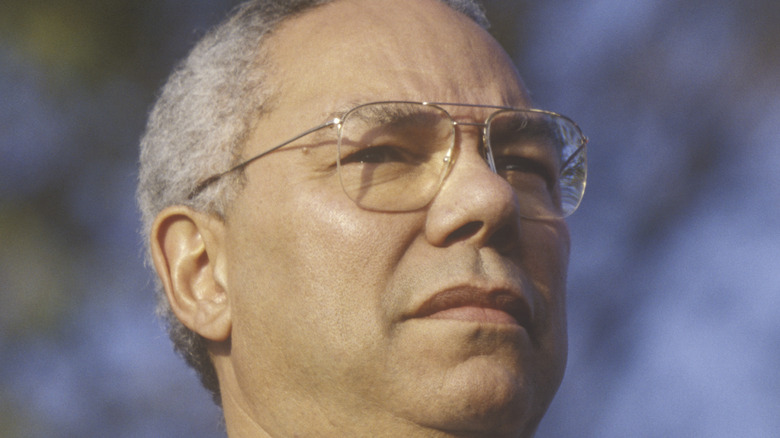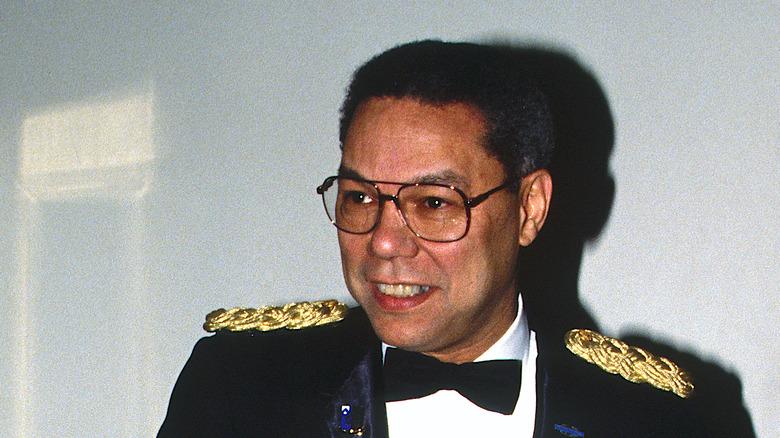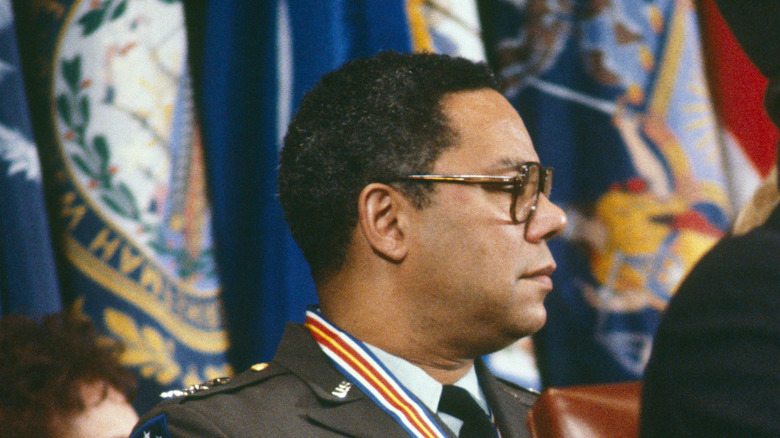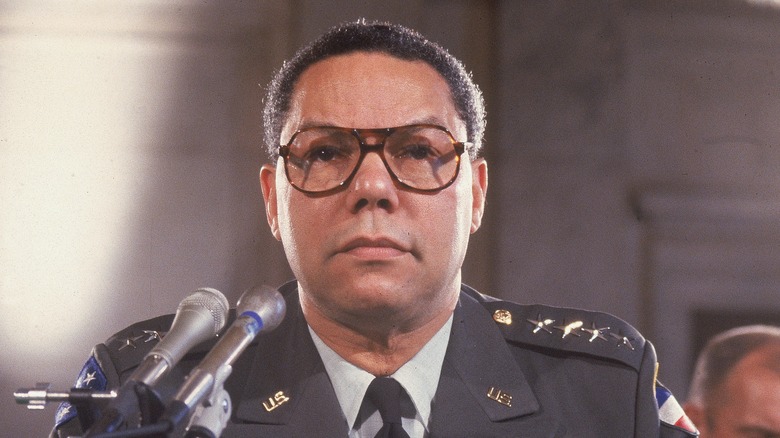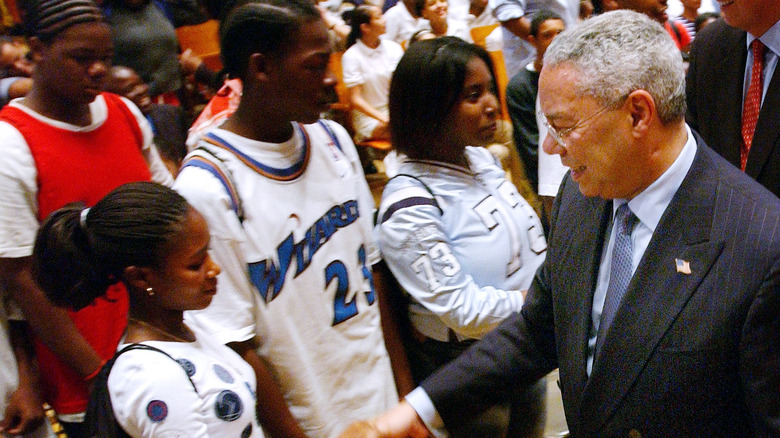The Heartbreaking Death Of Colin Powell
He made a name for himself for playing a lead role during some of the most contentious moments in modern American history. Former head of the Joint Chiefs of Staff and former Secretary of State Colin Leon Powell is dead at 84 after suffering from complications triggered by COVID-19.
A spokesperson from the Powell family confirmed his death via Facebook, saying: "General Colin L. Powell, former U.S. Secretary of State and Chairman of the Joint Chiefs of Staff, passed away this morning due to complications from Covid 19. He was fully vaccinated. We want to thank the medical staff at Walter Reed National Medical Center for their caring treatment. We have lost a remarkable and loving husband, father, grandfather and a great American."
Powell had been suffering from multiple myeloma, which is a type of blood cancer. The illness meant his immune system was compromised, and making it far less likely that a Covid-19 vaccine would have been effective. The Times quoted a study released in the summer which showed that only 45 percent of patients that were suffering with Powell's type of cancer developed an immune response from either the Pfizer or Moderna vaccines (via The New York Times)
Powell is survived by Alma Vivian Johnson. Together they have a son, Michael and two daughters Linda and Anne (via The White House Archives) as well as grandchildren.
Colin Powell's early interest in the military
Colin Powell didn't grow up as many distinguished senior officers in the U.S. military might have done, that is under the roof of a legacy military family. Powell was born to Luther and Maud Powell who had emigrated to the United States from Jamaica, and he was raised in the raised in the South Bronx section of New York, and was educated in the state's public school system (via The White House Archives). He tells Smithsonian Secretary Lonnie Bunch III that he didn't go to any special schools, and was in love with the area he grew up in, because as he put it, "every nationality, language was in that neighborhood" (via the National Museum of African American History and Culture).
Powell's interest in the military was nurtured by circumstance. He went to the City College of New York where he was drawn to the Army Reserve Officer Training Corps (ROTC). He says he was attracted to the life, its structure and discipline. As he put it, "I [also] liked being with a group of youngsters who were just like me with the same inclination toward military activity... and I found another family," he says. Aside from excelling at ROTC as a subject, Powell says he was influenced by two historic events that shaped his boyhood: World War Two and the Korean War.
He entered the army during a turbulent time, but excelled
Thanks to his time in the ROTC, Colin Powell found that military life was something he could get behind. He says "When I realised I was good at it, I was doing well, and I was getting promoted in ROTC, also joined a fraternity called the Pershing Rifles, he decided to "try it" by becoming a regular army officer" (via the National Museum of African American History and Culture).
Powell entered the armed forces at a historic time for the country. He says only six years had passed since the last army unit had been desegregated, and that technically, he was part of a first generation of black soldiers that had enlisted into an army that was completely integrated. And because he was from New York, he felt he was at an advantage — he came with none of the racial baggage he might have had if he came from the South. Upon enlisting, he told Bunch he was told to "meet standards, perform to the best of your ability whether you like the job or not, whether you like your boss or not, just perform, and you'll go up."
It was into that early, integrated environment that he had joined as second lieutenant in the Regular Army (via Joint Chiefs of Staff), and where he says he tried to be the best solider he could be, and that effort eventually took him to the top.
Powell rose through the ranks on the back of hard work
The early years of Colin Powell's time in the armed forces saw him complete training in infantry tactics, before traveling to U.S. military outposts around the country and the world. He served tours of duty in West Germany and Vietnam, where he first received a Purple Heart, and then a Soldier's Medal for going to a burning helicopter and rescuing fellow soldiers even though. he was also hurt. He also spent time during the 1970s in South Korea, where he was the head of a troop guarding the Demilitarized Zone that sits between the warring North and South.
As he was promised when he joined the armed forces, hard work saw him moving up the ranks, and eventually he became National Security Adviser under then President Ronald Reagan. He was promoted to Brigadier General in 1979, and received his 4th star as General a decade later. Months after he was named Commander in Chief of Forces Command and in charge of army reserves, former President George H.W. Bush named him the 12th Chairman of the Joint Chiefs of Staff. That appointment was significant, because Powell was the Joint Chiefs' first African-American, its first ROTC graduate, and the youngest officer to be in that position (via Joint Chiefs of Staff).
Colin Powell received accolades for his work and status
Until he stepped away from government service, Colin Powell was defined by the actions he took as the head of the Joint Chiefs of Staff under President George H.W. Bush, and as Secretary of State under former President George W. Bush. His four years as head of the Joint Chiefs were busy ones, and saw him managing no less than 28 crises including 1991's Operation Desert Storm (via State Department). He adopted several controversial positions, including the "Powell Doctrine", or the idea of using maximum force to achieve success and to cut down on casualties. He was also against the idea of admitting gays into the military (via Biography).
Powell also faced challenges as Secretary of State. It was under his watch that the September 11 attacks occurred, and he took the lead in demanding that al-Qaeda be held accountable. While he believed that Iraq had weapons of mass destruction, he was against the idea of attacking that country without the broad support of a coalition of allies. Outside of the military, Powell was instrumental in getting the Bush administration to give more to the fight against AIDS.
Colin Powell received many awards, including two Presidential Medals of Freedom, and the President's Citizens Medal (via The White House Archives). In private, Powell's work continued through his foundation, America's Promise Alliance, which is directed at the healthy, well-balanced development of young people around the country.
